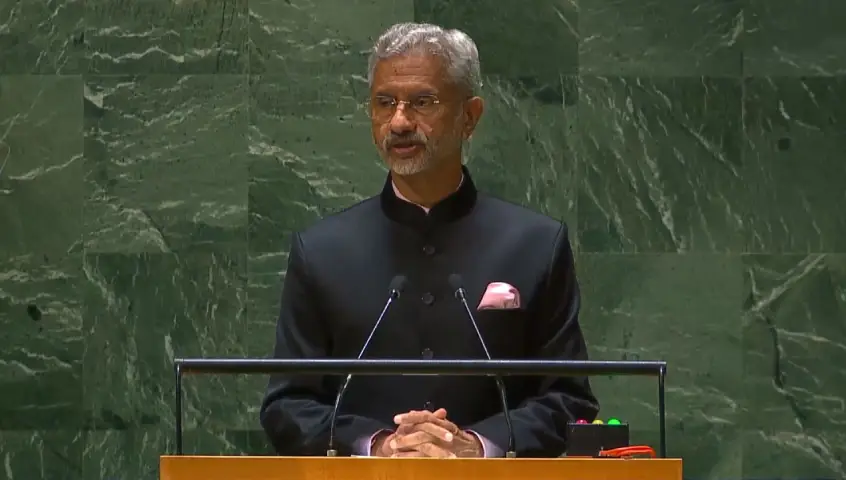

Jaishankar has called for a new world order during his speech at the UNGA in New York
External Affairs Minister S. Jaishankar on Tuesday served notice of big powers to brace for a contest with the Global South, which is no longer ready to accept dominance of the international system by a few countries.
“But for all the talk, it is still a few nations who shape the agenda and seek to define the norms. This cannot go on indefinitely. Nor will it go unchallenged. A fair, equitable, and democratic order will surely emerge, once we all put our minds to it. And for a start, that means ensuring that rule-makers do not subjugate rule-takers. After all, rules will work only when they apply equally to all,” he said.
Jaishankar’s remarks come amid a bitter row between India and Canada on the question of terrorism. India has accused Canada of sheltering Khalistani terrorists, while Canadian Prime Minister Justin Trudeau has publicly alluded to India’s complicity of killing Hardeep Singh Nijjar, a wanted Khalistani separatist and fugitive, who had been granted Canadian citizenship.
In a veiled reference to Canada, Jaishankar stressed that “political convenience” should not be countenanced in determining responses to terrorism.
By alluding to Canada, India was turning the heat on Ottawa, which is already facing a global outcry led by the Jewish community by giving a platform to a pro-Ukrainian Nazi insider in its parliament. This has raised suspicions that Trudeau’s Canada is a save haven of war criminals and terrorists who are shielded on the grounds of human rights.
The External Affairs Minister’s observations add heft to earlier remarks by the spokesperson of the Ministry of External Affairs on Trudeau’s accusations. “I think it is Canada and its growing reputation as a haven for terrorists, for extremists, and for organized crime. And I think that is a country that needs to worry about its international reputation,” the spokesperson had said.
“We know this for some time, from our western neighbour Pakistan. But the issue of safe havens and places to operate is being provided abroad, including in Canada… The question is, do we have the political will to address terrorism? Or we want to justify it and condone it,” he observed.
Targeting systematic discrimination by the Global North of the Global South, Jaishankar called out “vaccine apartheid” and fostering of food and energy insecurity by developed countries.
“The power of markets should not be utilized to steer food and energy from the needy to the wealthy. Nor must we countenance that political convenience determines responses to terrorism, extremism, and violence,” the minister said.
In a veiled reference to western attack on Russia over the Ukraine crisis, the EAM said that “respect for territorial integrity and non-interference in internal affairs cannot be exercises in cherry picking.”
He added: “When reality departs from rhetoric, we must have the courage to call it out. Without genuine solidarity, there can never be real trust. This is very much the sentiment of the Global South.”
Jaishankar also weaved into his address the urgency to draw India into the United Nations Security Council. He pointed out that UN Summit of the Future next year
“should serve as a serious opportunity to drive change, champion fairness and reform multilateralism, including the expansion of the Security Council memberships.”
Making a case for India’s entry into UNSC, Jaishankar pointed India’s exceptional scientific prowess, infrastructure development and world class startup culture that New Delhi can share with humanity.
“We are confident that our talent and creativity, now so visibly unleashed, will power us forward. The world saw a glimpse of what is to come when our Chandrayaan-3 landed on the moon.”
“Today, our message to the world is in digitally enabled governance and delivery, in the widening ambit of amenities and services, in rapidly growing infrastructure, and in our energetic Startup culture. It is visible too in vibrant cultural expressions, such as in the arts, yoga, wellness, and lifestyle. Our latest assertion is in a pathbreaking legislation to reserve one-third of the seats for women in our legislatures,” he said.
Jaishankar said he represents a progressive society where ancient traditions of democracy have struck deep modern roots.
“As a result, our thinking, approaches, and actions are now more grounded and authentic. As a civilizational polity that embraces modernity, we bring both tradition and technology equally confidently to the table. It is this fusion that today defines India, that is Bharat,” he said.
Also Read: UN must make reforms to stay relevant in modern world: Jaishankar
Union Minister of Ports, Shipping and Waterways, Sarbananda Sonowal, said on Monday that the number…
The inhabitants of Pakistan-occupied Jammu and Kashmir (PoJK) have been enduring years of neglect as…
The Defence Research and Development Organisation (DRDO) is set to make a significant impact at…
Cyprus President Nikos Christodoulides and Prime Minister Narendra Modi on Monday viewed the mountains near…
Cyprus President Nikos Christodoulides said he and Prime Minister Narendra Modi discussed expanding bilateral ties…
Prime Minister Narendra Modi said on Monday that India and Cyprus will develop a strong…